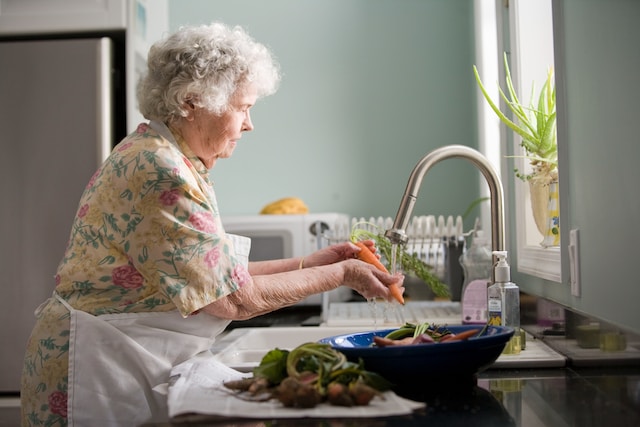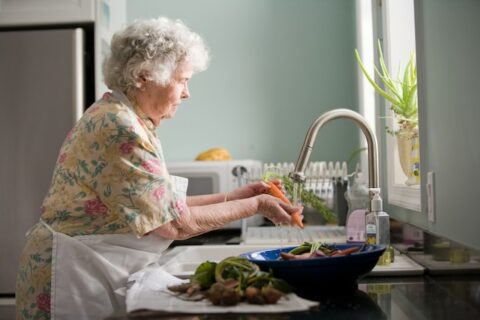Great thanks to the modern medicine and all of the healthy-living information out there, the elderly – those 65 and older – are now the fastest growing segment of the population worldwide. Seniors are often committed to taking better care of themselves, but as you get into your 70s and 80s, it’s not always easy to eat right, especially if you live alone. When you don’t have a family to cook for and aren’t all that hungry to begin with. Looks like reaching for a bag of chips or frozen dinner may seem way more convenient than sitting down to a well-balanced meal.
Well, ditch the excuse. As you get older, healthy eating become even more important, helping to combat debilitating conditions like osteoporosis, diabetes, and heart disease. In fact, one study found that as much as a half of all health problems in the elderly are related to poor diet. With that in mind, we put together some simple tips that will help you eat right and get all the good-for-you, help boosting nutrients you need without too much effort on healthy eating.
Eating less is better
As you get older, your metabolism slows down (those stubborn extra inches around your middle may have been your first clue), which means you don’t need to consume as many calories in a day.
But while you may be eating less, you need to boost the healthfulness of your meals. Meals should be packed of essential nutrients. Nutrition for seniors is particularly important, such as are calcium, vitamin D, B12, protein and fiber. On the good note, studies have found that those who eat less actually live longer not only because they maintain a mode healthy body, but also because they may be producing fewer damaging free radicals.
Put more colors on your plate
Liven up the dinner hour by creating a plate that looks bright and beautiful, loaded with fresh, healthy foods. Your body needs at least five servings of fruits and vegetables a day to reduce your risk of heart disease, lower your blood pressure and cancer risk, protect your eyesight and does much more good to elderly.
Add more flavors to your menu
No, you are not imagining this – food may taste bladder to you than it did once upon a time. That’s because your sense of smell and taste start to diminish in your later years, so dishes that may have once tickled your tastes buds may now fall flat. Of course, that does nothing to help with a loss of appetite.
Unfortunately, adding salt will just boost your blood pressure, which you definitely don’t want. Instead, get creative with spices and seasonings. You can add cinnamon to your morning oatmeal, garlic powder and dried basil to your vegetable soup, and oregano, thyme, rosemary, and sage to everything from baked chicken fillets to roasted potatoes or beetroots.
Less red meat and poultry for elderly
The Japanese have one of the lowest mortality rates in the world. What’s their secret? A diet loaded with healthy grains, veggies, fish and soy, but scant on meat, poultry and dairy. Similarly, people that follow a vegetarian diet also seem to have a longer and healthier life expectancy.
It makes sense when you think about it: those who consume little red meat and poultry usually weigh less, consume fewer bad fats, and eat more antioxidant-rich fruits and vegetables. Healthy eating does work!
Drink 6 to 8 fluid glasses a day
You know water is good for you and that you should be drinking it more often, but for a variety of reasons, seniors often neglect to replenish their H2O. Thanks to bladder-control problems that come with advanced age, you may not want to drink more fluids for fear you will be running off to the bathroom every 10 minutes. Plus, your sensitivity to thirst diminishes, so you may not be aware when your body is in desperate need of water.
All of these issues make you more susceptible to dehydration, which can cause you to become dizzy, fatigue, even confused. It can also contribute to constipation and even kidney problems. So be sure that you are getting at least six to eight glasses of liquid every day. You may even want to purchase two or three refillable BPA-free plastic water bottles that you can keep around your house and in your car to remind you to rehydrate and it is more convenient to do so.
Seniors need wine
Sitting down to a healthy meal is that much more enjoyable with a nice glass of wine and even a cold beer. Thes best part: a little bit of imbibing with a meal actually aids digestion. Also, according to research, red wine has been shown to have powerful anti-aging effects thanks to an ingredient called resveratrol. Of course, you do not want to go overboard – just one glass will do. Plus, you will want to check with your doctor to make sure that alcohol will not interact with any medications you are taking.
Some best foods for seniors
Here is a small list of foods that should be incorporated into your senior diet every day:
Kale. Calcium is essential to help maintain good bone health and prevent osteoporosis. Those over 70 need at least 1200mg a day, which is a lot. Luckily, it’s in a number of healthy foods, including dark leafy vegetables like kale – just 2 cups of raw kale gives you about 180mg of calcium.
Milk. In order for your body to absorb calcium, you need a daily supply of vitamin D. Often, you get that dose from exposure to sunlight, but if you find you spend a lot of time indoors, you will need to supplement. Milk is fortified with vitamin D, so a glass or two every day will give you some of what you need.
Fish. Omega-3 fatty acids, found in fish oils, are pretty much like a fountain of youth for the elderly. Not only do they prevent heart attack, but studies also found they can reduce your risk of macular degeneration and vision loss, as well as protect against Alzheimer’s disease. Researchers recommend eating fish high in omega-3 fatty acids but low in mercury – like salmon, trout, mackerel, herring, and sardines – a few times a week.
Berries. A recent study found that blueberries and strawberries may actually slow down mental decline in the elderly. Apparently, the flavonoids, abundant in berries, have powerful antioxidant properties that reduce the organ inflammation often blamed for cognitive impairment in seniors.
Beans. Legumes are packed with soluble fiber, known to help lower your bad cholesterol and blood sugar and help to curb constipation. As you get older, your digestive system slows down, so you will need to consume even more fiber to help move things along. Beans are a staple in any vegetarian diet because in addition to all that fiber, they are also full of protein and B vitamins, but with little saturated fats.
Whole grains. Another high-fiber food, whole grains have the added benefit of protecting against heart disease, diabetes, metabolic syndrome, and cancer. If your doctor is concerned about you losing weight, whole grain bread and crackers are a tasty, healthy way to help pack on pounds.
Cantaloupe. High in potassium, this sweet melon should be a diet staple for seniors. Not only does it lower blood pressure, it also helps build muscle strength.
Bottom line on nutrition for seniors
To ward off debilitating diseases such as diabetes and cancer, seniors need to be more aware of their diets. Seniors may eat less, but they need to make sure their meals supply the essential nutrients for this stage of life. Nutrients especially important during the senior years include calcium, vitamin D, B12, protein and fiber. For this reason vegetarian diet is advised. Properly hydrating with six to eight glasses of water a day can help keep bodily functions running smoothly.







